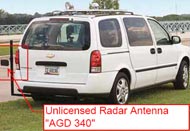8/20/2008
Speed Camera Vendors Engage in All-Out BattleState of Arizona hears contract argument of speed camera vendor claiming illegal actions on the part of a rival.

An Arizona-based vendor is going all-out in an attempt to win back a lucrative statewide speed camera contract from its Australian rival. American Traffic Solutions (ATS) issued a formal contract challenge last week seeking to unseat Redflex, saying the Melbourne-based company had won the right to issue speed camera citations on Arizona freeways only after using what ATS labeled "underhanded" and "illegal" tactics.
At the beginning of the year, both ATS and Redflex had made a claim on the title of largest photo enforcement vendor operating in the United States, as each had a similar share of the fast-growing market. That balance changed in July when the Arizona Department of Public Safety (DPS) tipped the scales decidedly in favor of Redflex. DPS awarded the Australian company a massive $20 million contract to operate a fleet of up to 200 speed cameras on freeways throughout the state. This victory made Redflex the undisputed top vendor, a title which brings significant marketing advantages.
As this major deal was being finalized, ATS noticed something startling -- it was illegal for Redflex to operate its latest speed camera units anywhere in the United States. On August 7 ATS lodged a formal complaint with the Federal Communications Commission alleging Redflex lacked the certifications required to prove that its radar equipment does not interfere with public safety systems (view complaint). Redflex immediately responded in a letter to the Arizona Department of Public Safety that this had been an "honest oversight." Redflex argued that its equipment meets all FCC standards, but the company misunderstood the licensing requirements. According to Redflex, this error was unintentional and not illegal because it constituted at worst a civil, not criminal, infraction. Joshua Grabel, the attorney representing ATS in the dispute, is not convinced.
"If this argument worked, a multitude of other arguments would as well," Grabel in wrote in a letter to DPS. "An Arizona resident could drive without a driver's license, and argue that they do not need to get the license because they are a very competent driver who could pass the driving test, if they wanted to.... Indeed, there is particular irony in Redflex, a company dedicated to administering programs in which civil fines for illegal speeding are issued, in asserting something would only be illegal if it was a criminal violation."
Redflex won the $20 million contract with the state of Arizona in part based on documentation that showed its RedflexSpeed 2000M unit was certified by the International Association of Chiefs of Police. But Redflex quietly switched out the radar used to achieve certification, a DRS-2, for newer AGD-340 and DRS-3 models, neither of which had received FCC approval. So both the legitimacy of the FCC and IACP certifications were in serious doubt.
It appears from documents filed with the state that ATS first discovered the certification issue in July when the company's executive vice president asked British radar manufacturer AGD Systems to ship a "demo" radar unit so that ATS could test its capabilities. AGD Commercial Manager Neil Keith revealed that the US Customs Service stopped a shipment of the company's radar units to Redflex offices in the United States more than a year ago over compliance issues. If true, Grabel argued, Redflex surely knew before August 7 that its latest speed camera system violated federal law.
Grabel went one step further to make the argument that Redflex intentionally violated the law. Although the Australian company sidelined radar vans used in the DPS freeway program when the FCC complaint was made public, Redflex did not inform other municipalities or remove non-compliant vans from service in other jurisdictions. ATS cited Paradise Valley's continued photo radar operations as evidence that Redflex continued to use the uncertified equipment even after the company knew doing so constituted a violation of federal regulations.
"If notice of the 'FCC Certification' issue was really what prompted Redflex to act, it would have extended the same courtesy to its other customers that it extended to DPS," Grabel wrote. "In reality, this is a smokescreen -- Redflex knew the issue, shielded it from its vendors, was hoping DPS is so enamored with Redflex that it will ignore Redflex's intentional violations of the FCC code.... The idea Redflex, after having illegally imported, marketed, distributed and used the AGD-340 on behalf of DPS, can wash its hands of that conduct by saying it did not know the law, and that DPS would opt to reward that conduct with a contract where one of the primary factors to be considered is the 'offeror's record of performance and integrity,' strains credulity,"
While the current spotlight remains on Arizona's contract, the federal rules apply in every state in which Redflex operates speed cameras, including Colorado, Louisiana, Ohio, Oregon and Washington. ATS did not respond to a request for comment as to whether the company would seek to invalidate contracts it believes were improperly adopted in other states.


